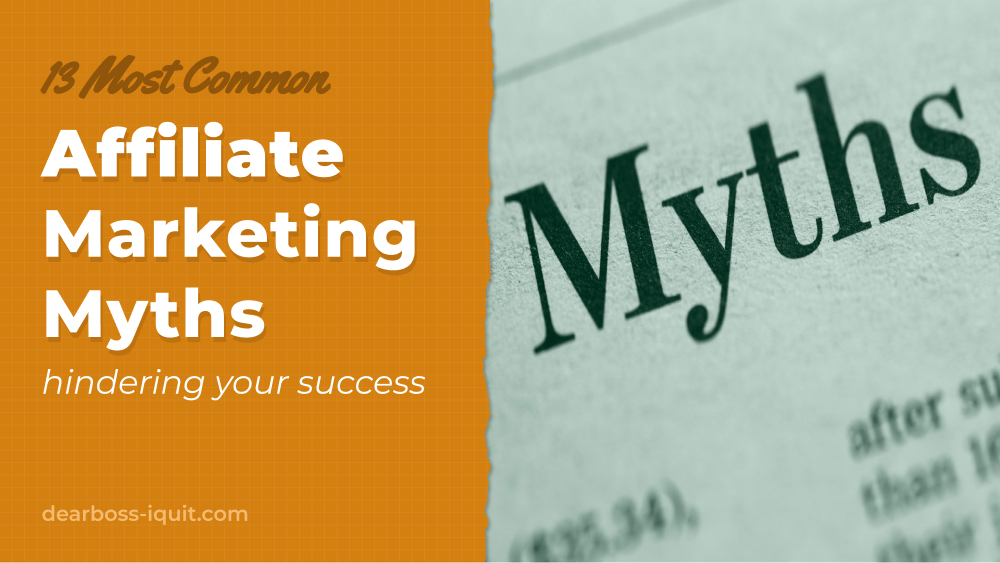Like any rapidly evolving industry, affiliate marketing is surrounded by its fair share of baseless misconceptions, that if mistaken for facts, can instill unrealistic expectations, cause confusion, hinder your progress, and minimize the likelihood of reaching affiliate success.
In this article, I’ll separate fact from fiction by dispelling the 13 most common affiliate marketing myths so that you embark on your journey with a clear and informed perspective that’ll help you increase your chances of thriving in the field.
Let’s take a closer look.
1. It’s Overly Saturated
There are tons of rumors about affiliate marketing being too saturated floating all around the internet. However, this notion is largely a myth propagated mostly by failed affiliate marketers as an excuse to justify their decision to throw in the towel.
While affiliate marketing is indeed a very competitive field, it isn’t inherently saturated. Nevertheless, certain niches might appear more saturated than others. For example, a more profitable niche will naturally attract more players, leading to increased competition.
That’s far from being a drawback as competitiveness is a tattletale sign of a stable and prosperous market. On top of that, a niche’s high competitiveness doesn’t necessarily mean that aspiring publishers are doomed to fail within it – it just means that achieving success might be somewhat more challenging.
Truth is, success can be found even in the most competitive markets.
Even though there might be thousands of restaurants within a city, hundreds of new ones manage to thrive every single year.
The same applies to affiliate marketing.
The fact that there might be countless affiliate businesses out there doesn’t mean that yours can’t prosper.
And, at the end of the day, if you’d rather not have to compete against a ton of other marketers, you always have the option to pursue a less crowded niche. As a matter of fact, such a course of action is highly suggested, especially for beginners, as it typically requires a much smaller investment of time, effort, and money.
2. It’s a Get-Rich-Quick Scheme
One of the most common myths is that affiliate marketing is a magic bullet to overnight wealth. This misconception can largely be attributed to two distinct factors:
- Unrealistic Claims: Affiliate marketing is usually portrayed as a path to quick and effortless riches to lure individuals into purchasing costly courses or programs
- Lack of Financial Education: People with limited financial knowledge might not be aware of the time and effort required to establish a source of income whether online or offline
Affiliate marketing is in no way a get-rich-quick scheme. Believing so, for any given reason, can have numerous negative consequences.
For once, when you realize that your initial expectations don’t align with reality, chances are you’ll get disappointed and throw in the towel. And even if you don’t, your unrealistic beliefs can still lead to poor decision-making, insufficient commitment, low-quality work, and ultimately failure.
Truth is, having a realistic outlook on everything involved in achieving affiliate success such as the steep learning curve, the tons of trial and error, and the massive amounts of patience and consistent work, is crucial to actually reach your financial goals.
This doesn’t apply only to affiliate marketing but to any substantial accomplishment in life, such as being fit, having healthy relationships, being mentally strong, landing a high-paying job, etc.
There are no such things as shortcuts to success, magic pills for quick results, or effortless gains. Just like transitioning from cold to hot requires energy, so does transitioning from where you currently are to where you want to be.
Success in the affiliate marketing field is undeniably attainable, but only as long as you discard the toxic get-rich-quick mindset and embark on your journey with a realistic perspective, fully prepared for the commitment, consistency, hard work, and patience entailed.
3. It Requires no Skills
Affiliate marketing is often regarded as a venture that requires no skills.
While it’s true that affiliate marketing does not require the same level of expertise as other business activities, and you can get started with it even if you have little to no relevant experience, becoming a successful affiliate does still require developing a certain set of skills like content creation, marketing, data analysis, SEO, website management, etc.
Frankly, the whole concept of expecting that money can be earned without delivering some form of value in exchange is absurd.
If you don’t have any affiliate-relevant skills, worry not – you can acquire and hone them over time as you’re building your affiliate business. After all, practical experience is one of the most valuable teachers.
On top of that, you can sign up for specialized online courses or consume free educational content like YouTube videos, podcasts, blog posts (like this one), etc. Having proper guidance can go a long way and significantly boost the likelihood of being successful.
If you already possess one or more skills that could benefit your affiliate endeavors, great news! They could help you not only gain an advantage over your competitors but also reach your goals faster and with less effort.
4. It’s Dead
Rumors say affiliate marketing is dead… Is it though?
Statistics reveal that the affiliate marketing industry has been experiencing a steady upward trajectory that will not stop anytime soon.
To be more specific:
- The global affiliate marketing industry is worth over $17 billion (source)
- Affiliate marketing’s global value grows 10% per year and is expected to surpass $27 billion by 2027 (source)
- The average affiliate marketer earns $8,038 per month (source)
- 17% of affiliate marketers earn over $50.000 per year (source)
- Interest in affiliate marketing has increased by 200% to 300% over the past 5 years (source)
- 53% of Amazon’s revenue is generated via affiliate marketing (source)
- Affiliate marketing is being implemented by over 100,000 companies worldwide (source)
- 84% of publishers use affiliate marketing to drive more revenue (source)
- Affiliate marketing drives around 16% of eCommerce sales in the US and Canada (source)
Those numbers are concrete proof that affiliate marketing is neither dead nor dying – it’s pretty much alive.
So why is affiliate marketing believed to be dead?
Many reasons, such as:
- Negative Bias: Some individuals may conclude that affiliate marketing is dead simply because they didn’t achieve the results they expected within their desired timeframe.
- Evolving Landscape: As time progresses, breaking into the affiliate marketing industry becomes increasingly challenging, leading to the belief that it might no longer be viable.
- Excuses: The claim that affiliate marketing is dead is regularly being rehashed by failed affiliate marketers to justify their inability to succeed and unwillingness to stick with it.
- Increased Competition: As affiliate marketing gains popularity, the competition within the field grows significantly. Some may perceive this increased competitiveness as a sign indicating affiliate marketing’s decline.
- Shifting Trends: Affiliate marketing trends are ever-changing. Those who are unable to keep up with them might find their efforts becoming less and less effective and wrongly assume that affiliate marketing is dead.
5. It’s Expensive
Over the years, I’ve heard many individuals claim that affiliate marketing is too expensive for them. In my experience, most of the time such claims stem either from misinformation or are used as an excuse to avoid taking action.
Truth is, since affiliate marketing doesn’t involve product development, maintaining stock, shipping orders, establishing a physical store, or hiring employees, the costs of starting and running an affiliate business are incredibly low.
As a matter of fact, you can start affiliate marketing for less than $100, and run your entire business for no more than just $500 per year.
To give you a frame of reference, according to Small Business Trends, the average startup and first-year operational costs of a typical brick-and-mortar business range between $30,000 and $40,000.
Nevertheless, there are indeed approaches to affiliate marketing that could require a much larger monetary investment.
For example, paid advertising is generally more costly than running a blog which, in turn, can set you back more than using social media. Additionally, hiring content creators can cost significantly more compared to producing the content yourself.
Other, mostly optional expenses might include marketing tools, training, legal advice, etc.
Ultimately, the costs associated with affiliate marketing can vary depending on factors like your marketing channel, promotional methods, goals, industry, and more. Nevertheless, you can definitely operate on a shoestring budget if that’s your preference.
6. It Requires No Investment
Another pretty common myth is that affiliate marketing doesn’t require any investment.
While starting and running an affiliate business with little to no money could be possible, assuming that you leverage a mix of the right approaches (e.g., social media and content marketing), achieving affiliate success involves other types of investments besides financial ones, like time and effort.
As a rule of thumb, the less money you invest in your affiliate endeavors, the more time and effort you’ll have to put in to become successful.
Think about it this way… If you spend $1000 per month to outsource let’s say your content needs, you probably won’t have to devote as much time and effort to producing it yourself.
Therefore, affiliate marketing does require some level of investment, even if it isn’t purely financial.
7. It’s a Pyramid Scheme
Claims of affiliate marketing being a pyramid scheme have been circulating the web for years. However, they couldn’t be further from reality.
Affiliate marketing and pyramid schemes are poles apart, and whoever claims otherwise has no clue about either what affiliate marketing or pyramid schemes really are.
Pyramid schemes are fraudulent and illegal activities in which participants earn money primarily by recruiting others rather than by promoting actual products or services. The structure of pyramid schemes is unsustainable, leading to most participants losing their money.
On the other hand, affiliate marketing is a perfectly legit business model in which affiliates earn commissions for referring customers to third-party merchants.
Therefore, there’s no connection between affiliate marketing and pyramid schemes.
8. It’s Passive Income
Affiliate marketing is merely an audience monetization method – it’s not passive income in and of itself.
This basically means that the potential for passive income doesn’t rely on affiliate marketing but rather on your capacity to set up systems that can attract, nurture, and convert customers on autopilot without continuous, manual effort.
One of the most proven ways to do that is by leveraging a combination of email marketing automation, landing pages, and content meant to be accessed via search engines (e.g., blog posts, YouTube videos, etc.).
However, building and optimizing such funnels to the point that they bring in a passive income without much involvement on your part still requires a significant amount of upfront commitment in terms of time, effort, and possibly money.
The exact same principle applies to any money-making venture that has the potential to turn into a source of passive income.
For example, while passive income can be generated through renting property, gathering enough money to actually purchase your rental property may require years of blood, tears, and sweat.
9. More Traffic = More Revenue
Acquiring more traffic is, if not the main, one of the most prominent concerns for the vast majority of affiliate marketers. That’s mostly because it’s widely believed that a larger audience is crucial to increasing affiliate revenue.
While the amount of traffic is undeniably a rather substantial indicator of affiliate success, there are also several other factors in play, such as:
- Audience Relevance: Less but highly relevant traffic is likely to yield much better returns than more users who aren’t that relevant.
- Traffic Quality: The quality of traffic is as important as its quantity. An engaged small audience can generate significantly more sales than a larger passive one.
- Marketing Focus: Low-volume, high-margin products can bring in significant profits even when promoted to very narrow audiences.
- Content Quality: Delivering high-quality content and valuable product suggestions can boost your credibility and conversion rates.
In conclusion, the key to building a thriving affiliate business is striking the right balance between traffic quantity and quality. A gigantic audience that doesn’t actually convert is worthless.
10. It Requires a Blog
Affiliate marketing can be done even without running a blog, simply by reaching out to your target audience via alternate content-sharing channels like social media, YouTube, email, paid ads, etc.
Nonetheless, running an affiliate blog comes with many compelling benefits, such as:
- Search Engine Traffic: Blog posts can be optimized to attract highly targeted organic traffic.
- Increased Credibility: Having a well-maintained blog can make your affiliate business appear much more credible and trustworthy.
- Monetization Diversity: Blogs can be monetized using various ways beyond just affiliate marketing like display ads, sponsored posts, CPA, renting ad space, etc.
- In-Depth Analytics: Generally, blogs can be integrated with a wide range of analytics tools, allowing you to gather more in-depth insights into your audience’s behaviors and the performance of your strategies.
- More Control: Operating your own blog will grant you unlimited freedom to call all the shots without the need to ensure compliance with third-party platform rules and regulations.
- Higher Exit Potential: A blog can be sold for 20 to 40 times its monthly profit. No other channel can yield as high multiples when sold.
Ultimately, affiliate success hinges on your ability to create valuable content and effectively promote the products or services you’re affiliated with, regardless of the platform you choose.
11. You’ll Need to be a Niche Expert
While having expertise in your chosen affiliate niche could be beneficial, it’s certainly not a prerequisite for success.
As already mentioned, affiliate success is closely tied to your ability to provide value to your target audience. And even if you’re not an expert, having even a little more experience than someone else in a particular area can be enough to deliver value to them.
To give you an example, a person who’s been developing apps for one year is definitely not an expert, but they’re still skilled enough to help individuals who are just starting out.
Some approaches that could help niche beginners boost their expertise include:
- Research: Keeping up with industry trends and continuously educating yourself about niche-relevant topics can steadily expand your knowledge
- Niche Passion: The enthusiasm of pursuing a niche you’re passionate about can compensate for your lack of experience
- Pro Partnerships: Collaborating with authoritative figures in your niche could help you gain valuable insights and establish yourself as an industry expert much easier
12. Higher Commissions = More Revenue
While taking into account commission rates is vital when deciding which affiliate products to promote, a well-rounded approach that also considers other important factors can lead to higher and more sustainable revenue.
Some of these factors are:
- Product Familiarity: Potential customers are more likely to trust and follow your affiliate suggestions if you have hands-on experience with the products you promote.
- Niche Relevance: A lower-paying product that perfectly fits your niche is likely to bring in much more revenue than a higher-paying but less relevant one.
- Product Quality: If you encourage your audience to waste money on subpar products, they’re extremely unlikely to trust your recommendations in the future.
- Cookie Duration: A longer cookie duration offers a greater window of opportunity to receive credit for delayed referred sales.
- Brand Reputation: Promoting products by reputable brands can positively affect your conversion rates, enhance your credibility, boost brand loyalty, and increase repeat business.
- Conversion Rates: Simply put low conversion rates = fewer sales = less money. Also, poor conversion rates are a tattletale sign of low-quality products that could hurt your credibility.
13. Anyone Can Succeed
Unfortunately, success in affiliate marketing, like success in any given endeavor, is not guaranteed for everyone.
Although there are no officially published success rates for affiliate marketers, I estimate that the percentage of people who succeed in affiliate marketing falls within the range of 4 to 10%.
While this percentage might seem somewhat low, it’s still among the highest in the make-money-online industry.
Also, keep in mind that affiliate failure isn’t a reflection of the field itself but rather influenced by personal shortcomings that might hold people back, such as:
- Unrealistic expectations
- Lack of proper training
- Insufficient effort
- Poor niche choice
- Not delivering value
- Lack of adaptability
- & more
Conclusion
In conclusion, the world of affiliate marketing is filled with myths thatact as barriers which might be holding you back from achieving your financial goals. Debunking these misconceptions is essential to paving your way to affiliate success.
The next time you hear some claim that seems to be holding you back, make sure that you remain skeptical and do your research until you uncover the truth behind it.
Always keep in mind that affiliate marketing is a legitimate and thriving venture that if approached it with a realistic mindset, dedication, and a willingness to invest the required time and effort, it can indeed become a source of substantial income.
Do you have any questions or need further with your affiliate marketing endeavors?
Leave a comment below or drop me a line and I’ll do my best to get back to you as soon as possible.
All the best, and stay safe,
Harry, Founder & Creative Director at dearboss-iquit.com



